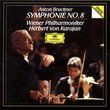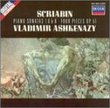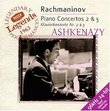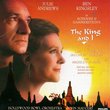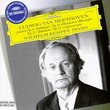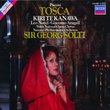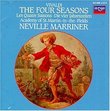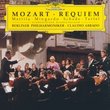| All Artists: Mozart, Chopin, Horszowski Title: Piano Music Members Wishing: 0 Total Copies: 0 Label: Nonesuch Release Date: 5/28/1992 Genres: Dance & Electronic, Classical Styles: Forms & Genres, Sonatas, Historical Periods, Classical (c.1770-1830), Modern, 20th, & 21st Century Number of Discs: 1 SwapaCD Credits: 1 UPC: 075597920222 |
Search - Mozart, Chopin, Horszowski :: Piano Music
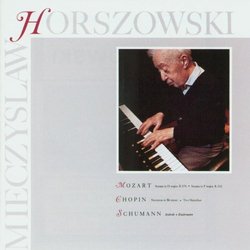 | Mozart, Chopin, Horszowski Piano Music Genres: Dance & Electronic, Classical
These are nearly ideal performances, without exception. Mieczyslaw Horszowski's Mozart is played directly, but with a wealth of nuance that conveys every subtle flicker of emotion in the music. The comfortable way he plays... more » |
Larger Image |
CD DetailsSynopsis
Amazon.com These are nearly ideal performances, without exception. Mieczyslaw Horszowski's Mozart is played directly, but with a wealth of nuance that conveys every subtle flicker of emotion in the music. The comfortable way he plays the tricky finale of K. 332 is remarkable. Three Chopin pieces--two mazurkas and a nocturne--are kept within fairly strict rhythmic bounds, while almost imperceptible emphases point our attention towards every expressive intention. The two Schumann works are equally remarkable. Only a faint hint of blurring in moments of Kinderszenen, barely noticeable, provides a clue that the pianist was almost 96 when he recorded this exquisite disc. --Leslie Gerber Similarly Requested CDs
|
CD ReviewsSheer Magic... Hank Drake | Cleveland, OH United States | 09/27/2005 (5 out of 5 stars) "Mieczyslaw Horszowski lived to the age of 101 and enjoyed the longest career in the history of the performing arts. He never achieved, or aspired to, the notoriety of his friends Arthur Rubinstein and Vladimir Horowitz. But in his last decade, he became something of a cult figure, his performances and recordings sought out by those curious about this last link to the Golden Age of Piano Playing, and those simply wondering whether someone so elderly could still move his fingers. As record producer Max Wilcox wrote, "the fact that his body is old is beside the point." Wilcox, who worked with Rubinstein, signed Horszowski to the Nonesuch label in the mid-1980s, and together they made four fine recordings. This one, from 1988, is the second of those four. From the first bar of the two Mozart Sonatas, one's ears are caressed by the beauty and variety of Horszowski's tone. It's not for nothing that he was a pupil of the great Leschetitzky, who worked ceaselessly on tonal production. (We are fortunate that Horszowski lived long enough to pass this gift onto his pupils Murray Perahia and Radu Lupu.) Horszowski neither confines the sonatas to a small scale, nor hammers compositional points home (ALA Glenn Gould), but simply plays the music in a sensible tempo, with discrete rubato and dazzlingly even passage work--which serve to remind one that Mozart was a virtuoso pianist as well as a composer. Horszowski's Chopin is ravishing, as befits a fellow Pole--whose mother studied with Karl Mikuli, himself a pupil of Chopin. Sometimes referred to as a Romantic pianist, Horszowski is Classically oriented in all respects save two: his way of phrasing a group of notes as a singer would, and his de-emphasis of the bar line. His Mazurkas have an irresistible rhythmic lilt, and I've never heard the C major Mazurka played better. Horszowski brings tender longing to Schumann's Arabeske, with a beautiful legato touch. He gives the Kinderszenen as if experienced in childhood, rather than as an adult's reminiscence. I don't agree with this approach. What is the disillusionment of the last piece "the Poet Speaks" if not the work of an adult composer? But, within his conception, Horszowski's performance, innocent and with flashes of humor, works on it own terms. Recorded at Philadelphia's Curtis Institute of Music, where Horszowski taught for fifty years, the sound is clear, spacious, and natural." Marvelous Journey to a Past World of Pianism Doug - Haydn Fan | California | 05/10/2009 (5 out of 5 stars) "On the inside cover of this Cd's notes an eleven year old Miecio Horszowski sits straddling an Italian Renaissance chair, his light brown hair done up in a Buster Brown cut, a dark velvet jacket opening on a white vest shirt. It's an advertisement for his "Second Piano Recital", May 18th, 1906 at Steinway Hall, London. But in fact, the young prodigy had appeared several years earlier, giving his first public recitals in Vienna in 1902 while a pupil of probably the most legendary piano teacher of the turn of the century, Theodor Leschetitzky. Zoom forward to nearly the end of the 20th Century. It's now May 10th, 1988. A great, great deal has passed in the interim. The young boy is now a very old man of 95, sitting before a piano inside a small auditorium of Philadelphia's Curtis Institute of Music, reminiscing. He recalls giving the premiere of Beethoven's Hammerklavier in Rio De Janeiro in a concert sponsored by the composer Villa-Lobos. "In the audience was the pianist who played the first New York performance of the Waldstein Sonata, in the 1880's when he was perhaps 20 years old. Arthur Napoleon was his name. He was quite a good pianist. We played two pianos together - the beautiful Saint-Saens Variations on a Theme by Beethoven." Horszowski then talks about Schumann's Kinderszenen - "They are Scenes from Childhood as experienced in childhood - not by an adult remembering." There follows an entire paragraph of his thoughts on the music filling up half a page of notes. Listening to Horszowski is not so much a privlege as an honor. It is also a rare treat, and a complete joy. His playing is gentle but rarely slack, despite nearly a century of life he still finds a way to sparkle, and phrases with distinction. Quieter passages maintain charm, an enviable feat at any age. The Chopin playing, disarms by its simplicity, perhaps not surprising as his mother studied under Chopin's pupil Karl Mikuli. The Schumann, if certainly not overly boisterous, contains a myriad of little touches of fun and frolic and imagination. This sort of music-making is a gift, and should be treasured. The Mozart is played with intelligence, poise, and that ineffable charm he bestows on the Romantic composers. Again, it's miraculous to find such quality of playing united with such a full lifetime. A special and charming Cd, and one not only for the connosieur and collector of esoteria, but the average music lover. In the end, you listen to the music-making, and forget the fact Horszowski was approaching one hundred when he sat down before the keyboard." One of the greatest ever dm | rochester, ny | 06/15/2007 (5 out of 5 stars) "Listen to this, or any other Horszowski recording, and you'll come to the inescapable conclusion that he is definitely one of the greatest pianists ever. His playing of Mozart is, in my opinion, without peer. The sonatas, on this disc, and the concertos, played elsewhere, are performed with such skill and beauty that they must be listened to.
I'm not sure what's "in the water" in Poland, but that country has produced some of the greatest ever, and we're lucky that Horszowski is one of the few that we can hear great digital-quality recordings of." |

 Track Listings (23) - Disc #1
Track Listings (23) - Disc #1